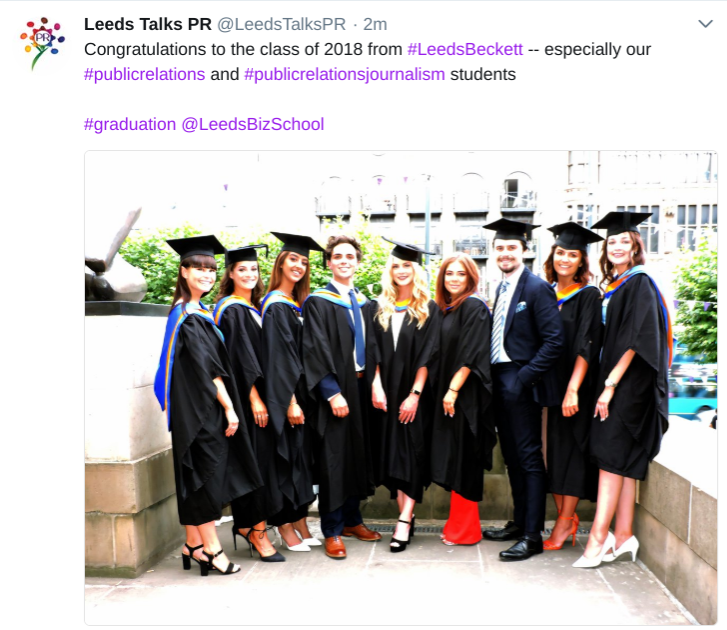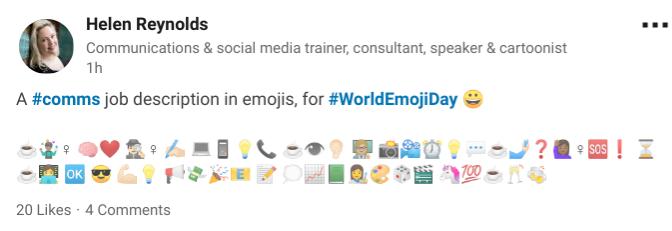This week in PR (20 July)

About the author
Richard Bailey Hon FCIPR is editor of PR Academy's PR Place Insights. He teaches and assesses undergraduate, postgraduate and professional students.

Behind the headlines

- The International Communications Consultancy Organisation (ICCO) is introducing an international Partner University Programme and promises an annual event bringing academics and practitioners together.
- The Association of Professional Political Consultants (APPC) management committee is recommending a merger with the PRCA. This will be put to members.
- In the PR Internships Awards, the prize for Best Intern went to Selina Khan who interned at Government Communication Service (GCS); Olivia Shalofsky was highly commended (read more from her below). Freshwater UK was recognised for having the best internship programme; GCS was highly commended.
- CIPR has published new policy guidance for those experiencing sexual harassment at work.
- The updated UK Corporate Governance Code from the Financial Reporting Council ‘places emphasis on businesses building trust by forging strong relationships with key stakeholders. It calls for companies to establish a corporate culture that is aligned with the company purpose, business strategy, promotes integrity and values diversity.’
- Weber Shandwick has acquired creative agency That Lot, co-founded in 2014 by David Schneider (of “The Day Today” and BAFTA-nominated “The Death of Stalin”) (via Holmes Report).
- Media effects: BBC reports Ofcom data showing that streaming services such as Netflix and Amazon now have more subscribers than pay TV channels in the UK. We also learn that teenagers are having less sex: there has been a ‘sharp fall’ in teenage pregnancies since 2007, sometimes ascribed to the rise of social media.
- Richard Millington’s Feverbee has produced a list of 1336 brand communities, browsable by sector or platform.
- What a week for apologies and reverse-ferrets. Elon Musk ‘spoke in anger’ and Donald Trump ‘misspoke’.
- IC Kollectif is asking in house practitioners to complete this survey with one open question on the blurring of the lines between internal and external communication.
Calendar
Our calendar of events now appears on a separate page
Insights and opinions: Pick of the posts
These are the editor’s pick of posts about public relations this week (UK focused, but with a global outlook). Recommendations are welcome to editor@prplace.com or @pr_place
Business / profession
- Dan Slee: PUNK ATTITUDE: Today’s comms person needs to learn three chords and form a band over and over to still have a job in 20 years time (17 July)
‘Will there even be a place for today’s comms people in a world in 20 years time when there are people around who’ve always known social media?’ - Stephen Waddington: Video: James Grunig on Excellence Theory (16 July)
‘Every PR practitioner should have a working knowledge of Grunig’s theories although he acknowledges that his work is more widely taught and discussed in academia than it is in practice.’ - Francis Ingham: Postcard from Bled (16 July)
‘There is some very deep thinking about the future of our industry going on right now. The range of topics covered by the papers presented was vast – AI, ethics, evaluation, theories of engagement.’ - Emma McCallum: CIPR Northern Conference – handling crisis, effective consultation, embracing AI and meeting the Godfather of PR (15 July)
‘[Laurie Bell] finished her brilliant half hour on stage by urging us all to recognise the significance of our role, saying “…any good board member should have their communications person at their right hand. If they don’t do that, then they deserve to have the reputation that they have.” - Arun Sudhaman with Michael Frohlich: The Echo Chamber Podcast (13 July)
‘Are you bored of the ‘PR person takes over the ad agency’ narrative?’
Public and third sector
- Richard Evans: Charity Twitter accounts lose thousands of followers (19 July)
‘37 of the 83 charity Twitter accounts I looked at lost more than 1,000 followers over those 12 days. Six of them lost more than 5,000.’ - Neil Williams: Why GOV.UK content should be published in HTML and not PDF (16 July)
‘Compared with HTML content, information published in a PDF is harder to find, use and maintain. More importantly, unless created with sufficient care PDFs can often be bad for accessibility and rarely comply with open standards.’ - Emma Rodgers: Why I loved Commscamp 2018 (17 July)
‘It was the biggest Commscamp ever and given it’s the sixth one, we’re pretty darn chuffed about that.’ - Simon Francis: Campaigners mustn’t feel chilled by the Lobbying Act (16 July)
‘The chilling reality of the Lobbying Act is clear to see, but the Act is here to stay as the government has rejected any attempts to reform or repeal the poorly worded and badly implemented legislation.’ - Amanda Nash: What I have learned from Croatia (13 July)
‘What Croatia has in bundles is team spirit. Their nickname is #Vatreni which I think translates as Fire or Blazers. Watch how they touch the national badge on their shirts with honour and allegiance. This means something to them. They care, about results and each other.’
Careers and skills

- Arianne Williams: What’s the point of blogging? (20 July)
‘Obviously, it’s great to get lots of views and have some feedback – ideally positive or constructive – but for me, it’s not the be all and end all. I started to blog for me, and any feedback I get from it is an added bonus. - Sarina Kiayani: Interning Insight: My Experience at Aequitas (no date)
‘I was tasked with things that I at first thought were out of my depth. I soon realised that these were the daily tasks of any successful PR worker, and I should relish the opportunity to attempt them to the best of my ability.’ - Amanda Coleman: The future of PR (18 July)
‘I am a communication and PR geek. I love it. I love the creativity, the difference it can make, the human aspects and the opportunities it brings. This has to be one of the most enjoyable, challenging and interesting professions. We need to capture what it is and share it particularly with the young people considering their career choices.’ - Laura Sutherland: PR and coding: learning new skills from other disciplines (18 July)
‘Coding isn’t something you’d immediately think of when describing PR skills, but the more we move into the tech space, the more we need to understand basic code.’ - John Brown: Top tips for tech communication and branding [vlog] (17 July)
‘While some of my mates in consumer PR were being taken to the Brit Awards, I was being given a Toshiba mouse mat. But I learnt a shed load.’ - Olivia Shalofsky: Starting from the bottom. How to make the most of an internship (17 July)
‘The publication of our research helped a petition for dog theft law reform succeed in making its way to Parliament – where my team joined with campaigners and MPs to debate harsher prosecutions for dog thieves.’
Campaigns and creativity

- Jennifer Sanchis: Agency Profile: Bottle (no date)
‘We treat everything – no matter how short – like it’s an episode in the brand’s narrative. Keeping those episodes flowing means that they add-up to the big-story.’ - Abi Bunce: Feeling Festive in 30 Degrees! (13 July)
‘With so many brands putting on their own Christmas in July events and fighting to be included within the likes of the Vogue’s Christmas Gifts For Her and the Telegraph’s Christmas Gift Guide, what gives these events media appeal?’
Crisis and reputation
- Stuart Thomson: How to build your reputation through influence and thought leadership (18 July)
‘Planned properly, influence and thought leadership can help build and protect a reputation.’ - Jon Meakin: Papa John’s and the Personification of the Brand (16 July)
‘To what extent the brand that bears his name can survive, is another matter. Mr Schnatter’s likeness is already being removed from all packaging and marketing materials and the company is taking a leaf out of Uber’s book by bringing in an outside auditor to investigate and recommend changes to its culture, policies and processes.’
Internal communication
- Robin Gillie: Internal Communications in an Age of Anxiety (no date)
‘In reality, most organisations are working under some sort of uncertainty, so it’s not that organisations have periods of uncertainty for a few months and then it gets back to normal, it’s constant.’ - Rachel Miller: How can internal communication be improved? (17 July)
‘What do you want people to do/say/think/feel differently as a result of your internal communication? If you don’t know the answer to these questions, you will waste time.’ - Jenni Field: The art of science and engagement in internal communication (16 July)
‘Our brains have one core purpose – to survive. To survive they need two key things; to seek out rewards and to avoid threats.’ - Saskia Jones: 9 Tips for Communicating your Business Strategy (13 July)
Media and digital
- Paul Sutton with Kate Hartley: The importance of humanity in a digital world [podcast] (19 July)
‘In spite of – or perhaps because of – all of the current technological advancements, the value of humanity has never been greater for marketers.’ - Alex Lamb: Video Wars: Instagram v YouTube (17 July)
‘Teens are watching 40% less TV than they did five years ago, and people are watching 60% more video on Instagram in the past year alone.’ - Daryl Wilcox: Birth of the service that ‘democratises media relations’ (17 July)
‘The service works so well for journalists that at one event I attended recently a freelance journalist told me that if it wasn’t for the ResponseSource Journalist Enquiry Service he would ‘have to get a proper staff job’.’ - Tony Cuthbertson: Asda newsdesk story discovery supports authentic PR engagement (17 July)
‘Here’s the story-finding process that we use to generate a regular flow of stories from across an organisation such as Asda.’ - Keith Weed: When it comes to influencer relationships, it’s complicated (17 July)
‘At Unilever, we believe working with creators is an important way to create engaging content to reach and build trust with our audiences, and so we strive to establish mutually beneficial partnerships.’ - Neville Hobson: Twitter removes fake followers to build trust in follower counts (16 July)
‘Fake followers, “problematic accounts,” spam and bots add up to a toxic mix of distrust. If Twitter’s latest actions do result in weeding out fake followers and other bad actors, then a reduction in your follower count is a good thing.’